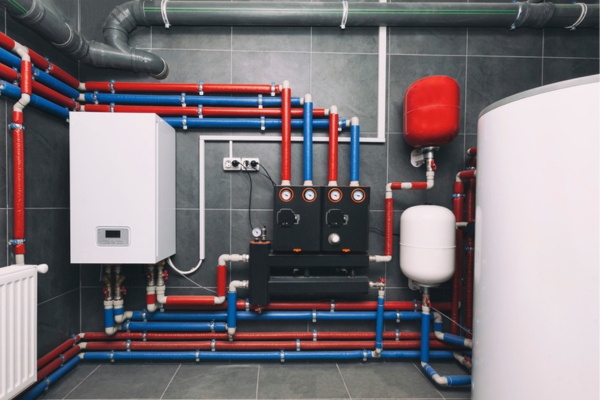Table of Contents
Even the sturdiest systems encounter limitations over time. Your aged boiler, having diligently provided service for many years, will inevitably begin to falter in performance, efficiency, and dependability. When the cost and frequency of repairs no longer justify keeping the old unit, it becomes clear that a new oil boiler installation is a wise choice.
This transition offers a perfect chance to opt for a system enhanced with modern features that better meet your current lifestyle and needs. Keep reading this article from County Line Fuel to learn about critical considerations when choosing your next oil boiler.
Key Considerations for Purchasing an Oil Boiler
Upgrading your oil boiler is a significant decision and involves several complex factors. It’s essential to thoroughly examine all the options at your disposal and assess your residence’s unique requirements. If the specifics seem daunting, consulting with an HVAC expert is advisable. They can offer professional insights and respond to any queries you have. This expert guidance will assist you in navigating the oil boiler installation process effectively.
Below, we outline important considerations to keep in mind as you prepare for your oil boiler upgrade:
1. Type of Oil Boiler

When selecting an oil boiler, homeowners can choose between steam and hot water boilers, depending on their specific needs and preferences. Steam boilers function at higher temperatures and generally require fewer additional components. This makes them ideal for larger residences or industrial environments where high heat is essential.
On the other hand, hot water boilers provide a safer structure and enhanced efficiency, which are perfect for small to medium-sized homes. Both steam and hot water boilers can utilize heating oil or natural gas as their energy source. In numerous regions, such as New Jersey, heating oil is frequently preferred for its affordability and availability.
Contact Us for a Free Consultation: Ready to upgrade your heating? Get in touch with our experts today for a free consultation on the best heating solutions for your home.
2. Heating Oil Boiler Size
It’s a common misconception among homeowners that bigger boilers are always better. This is not necessarily true. The goal is to identify the boiler size that perfectly matches your home’s needs. An oversized boiler often causes “short-cycling,” which means it heats the space too quickly and turns off soon after, leading to frequent starts and stops. This excessive cycling can put undue stress on the boiler, increasing wear and risking early failures.
Although replacing your old boiler with a similarly sized model might seem straightforward, it is advisable to consult an HVAC specialist. They can conduct precise measurements and calculations to ensure the new boiler meets your home’s requirements.
3. Efficiency in Oil Boilers
While the upfront cost is important, homeowners should also focus on operational expenses. Heating systems are among the highest energy consumers in homes, making it crucial to minimize ongoing costs. Investing in a high-efficiency oil boiler can initially be more expensive, but it dramatically reduces fuel expenses over time.
The Annual Fuel Utilization Efficiency (AFUE) rating indicates how effectively a boiler converts fuel into energy throughout the heating season. Opting for a higher AFUE rating unit during your oil boiler installation ensures better performance and energy savings. Boilers that achieve the highest levels of efficiency are recognized with the Energy Star label.
Improve Your Home’s Heating Efficiency: Explore how upgrading to a more efficient boiler can lower your energy bills. Contact us to learn more!
4. Maintenance of Oil-Fired Boilers
Heating systems require regular and consistent maintenance to ensure optimal performance and extend their lifespan. Different types of boilers may need specific maintenance routines. Understand the maintenance requirements of various models before making a selection, ensuring you are prepared for the ownership responsibilities. Remember that not all maintenance tasks are suitable for DIY approaches. Some necessitate the expertise of trained HVAC technicians. To promote system longevity, arrange for professional maintenance annually.
5. Regional Climate

The local climate significantly influences the demands placed on your heating system. In some regions, the cold is severe enough to require a boiler only during the winter months. However, the chill might extend throughout the year in other areas, necessitating a boiler that can handle constant operation. Homeowners must choose a boiler capable of managing the specific thermal load.
Tailored Heating Solutions Just for You: Every home is unique. Let us provide you with a heating solution that’s perfectly tailored to your specific needs.
6. Venting Requirements for Boilers
Proper ventilation is essential for boilers to expel exhaust gases produced during fuel combustion safely. Choosing a venting method that aligns with your home’s structural design is important. Chimney-vented boilers discharge gases through a vertical stack, utilizing the natural buoyancy of hot, low-density fumes to ascend and exit.
Alternatively, power-vented boilers employ fans to actively expel gases, suitable for homes lacking a traditional chimney. This method requires installation in a spacious room with ample air circulation. Direct-vented boilers offer flexibility for placement in more confined areas since they do not depend on indoor air for venting.
7. Oil Boiler Brand Name

Manufacturers each bring their unique innovations to the table, with some brands standing out due to their superior boiler designs. Well-regarded brands often excel in durability and efficiency, and they might also offer more dependable customer service for warranty repairs.
Homeowners should research the leading brands in the market and consider seeking opinions from trusted friends with firsthand experience. Additionally, with their extensive industry experience, HVAC contractors can offer invaluable insights and recommendations for your oil boiler installation.
Experience the Best in Home Heating: Upgrade your home with a high-efficiency oil boiler. Call us to find out how you can enhance comfort and save on costs.
Boiler Efficiency FAQs

Here are some frequently asked questions to help you understand the efficiency aspects of oil boilers.
What Should I Do If My Current Oil Boiler Isn’t Efficient Anymore?
When you notice your boiler’s efficiency declining, a certified HVAC technician must arrange a diagnostic evaluation. They can determine if maintenance might restore its efficiency or if replacing it is the better option. Upgrading to a new, high-efficiency boiler can substantially lower your heating costs and enhance your home’s comfort.
What Are the Steps to Upgrading My Oil Boiler?
The process of upgrading your oil boiler includes several crucial steps: evaluating the performance of your current heating system, consulting with a professional to select the correct size and model, and having the new system expertly installed. Choose a boiler that meets the latest Energy Star standards to ensure maximum efficiency and performance.
Find the Right Boiler for Your Home: Unsure about the right boiler size or type for your home? Our experts are here to help you choose the ideal model.
How Do I Find Out the Correct Boiler Size for My Home?
Choosing the correct size for your oil boiler is essential for efficient heating. An HVAC specialist can conduct a heat loss calculation that factors in your home’s size, insulation quality, local climate, and heating requirements. This calculation helps ensure that your boiler operates efficiently without underperformance or excessive energy wastage due to frequent cycling.
What Are the Benefits of Energy Star-Certified Oil Boilers?
Energy Star-certified oil boilers are more energy-efficient than standard models, helping you save on fuel costs and reduce your environmental impact. These boilers comply with rigorous energy efficiency standards set by the EPA and the Department of Energy, ensuring they deliver superior performance with reduced emissions.
How Often Should I Have Maintenance Done on My New Oil Boiler?
Consistent maintenance is critical for maintaining the efficiency and longevity of your oil boiler. Schedule professional maintenance annually, preferably before the start of the heating season. Typical maintenance activities include cleaning the boiler, checking for leaks, evaluating burner efficiency, and ensuring the system operates safely and effectively. Regular maintenance extends the life of your boiler and ensures it remains efficient and safe to operate.
Stay Warm with Reliable Heating Services: Choose our reliable heating services to keep your home warm and comfortable all year round. Call now!
Conclusion
Selecting the ideal boiler system for your home hinges on your specific circumstances. Simplify your search by hiring a trusted local HVAC contractor. If your existing heating system operates on heating oil, consider opting for another oil boiler to keep replacement costs down. Ensure a good fit by matching the efficiency rating, system capacity, venting needs, and brand name to your home’s requirements for a successful oil boiler installation.
Call County Line Fuel For Your Home HVAC Needs

County Line Fuel delivers top-notch heating and cooling services in Clinton, NJ, and the surrounding areas. We employ highly skilled certified technicians who excel at HVAC tune-ups, repairs, installations, and replacements. Our technicians have the expertise and experience to handle your HVAC system precisely.
At County Line Fuel, we offer the area’s most competitive costs for heating and cooling services. Should you require a replacement HVAC system, we can recommend the ideal option for your home while ensuring it fits your budget. Our focus always remains on energy efficiency, comfort, indoor air quality, and more. To set up an appointment, contact County Line Fuel today for a complimentary in-home estimate.
You can click here to contact us now or call us at (908) 735-7610 to find out more! Click the link to view our service area.
Related Articles:
